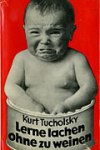The battles which Heine[1] and Börne[2] had to fight against censorship were battles against the red marking pen. The censor crossed out. The battles which film has to fight against censorship are battles against the scissors. The censor cuts. We don’t have freedom of the press, if one asks, “Free from what?” But we do have a sort of freedom of book publication.
But every time technology invents a new medium for the expression of opinion, the reactionary snobs are shocked to the marrow. And the so-called progressive parties fall for this shock, promptly, every time. “One can’t release just any old film…“ which is exactly how the pious clergy reacted to the emergence of the printing press, and every book had to bear the imprimatur of the Archbishop or territorial lord. One could only print in those days with permission from the highest authorities. It took a long time for literature to free itself from these shackles.
What radio and film produce these days is chemically cleansed stuff, which has lost its natural flavour. The airwaves are just a big nursery, the cinema screen a bib tied around the baby public. One spoon after the other, but only porridge. It is, as we can see in the case of books, simply stupid to assert that normal penal law is inadequate. Of course a picture makes more of an impression than a word, but if filth, or brutality or insults, are photographed, penal law is perfectly adequate. The radio in central Europe is in the hands of the ruling class, and that is not a good place for it to be. It twists the new instrument so that it does not produce nearly all that it could.
The limp excuse of the „sensibility of those of other beliefs,“ which, “one must not offend”, is nonsense. Messrs Schulze and Levi should get used to the idea of ignoring a film which they don’t like, and that an aerial can be earthed. The dictatorship of these mediocrities is nearly as bad as the hardly disguised fascism which is running riot in film and radio. This censorship is a mixture of insolence and fear. It is not even systematic. The only constant in the prohibitions is the clear tendency against the left. The share prices could become unstable if someone were to reveal how much profit there is in the production of light-bulbs. The topic must not be dealt with, said the imperial constable, seized his helmet, and broke up the meeting. Otherwise, there is no indication of the basic principles of this laughable censorship. The church is often offended, but then she always is, and a comic verse like that by Klabund[3] about the Three Kings, can be published, but not without the social-democrat Braun[4] referring to the verse as offensive, in an abject letter of apology to the Centre[5] party. Oh, Bebel[6], Bebel! It can be published, but not broadcast in the radio. Any justification of this inconsistency is a lie. Radio and film are simply more effective than a book, but they have not yet achieved their freedom, so they can be suppressed and censored. Read books! They are little islands of freedom in the sea of censorship.
[1] http://en.wikipedia.org/wiki/Heinrich_Heine
[2] http://en.wikipedia.org/wiki/Ludwig_B%C3%B6rne
[3] http://en.wikipedia.org/wiki/Klabund
[4] http://en.wikipedia.org/wiki/Otto_Braun
[5] http://en.wikipedia.org/wiki/Zentrumspartei
[6] http://en.wikipedia.org/wiki/Bebel
Published in:  Tucholsky Panter, Tiger & Co.
Tucholsky Panter, Tiger & Co.

